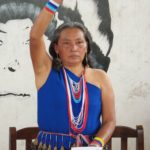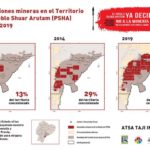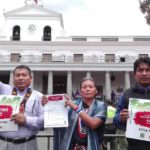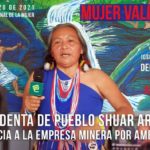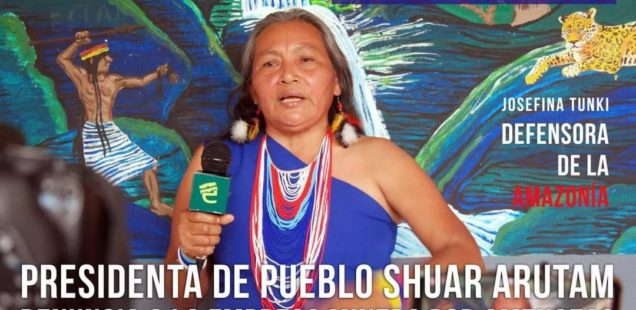
Josefina Antonieta Tunki Tiris – first woman President of the Shuar Arutam people of Ecuador, courageous defender of her territory of life in the face of polluting mining industry
In 2019, Josefina Antonieta Tunki Tiris— Tunki to her colleagues— was elected President of the Shuar Arutam people of Ecuador. Being the first woman President of her people, Tunki has a historic role and meets particular challenges, which she is facing in a most courageous way. Indeed, Tunki has the ‘luck’ of confronting multiple tensions and conflicts. Externally, she has been facing significant attacks and threats from the mining company Solaris and from the government authorities who collaborate to disempower the people against polluting extractive activities. Internally, she is the only woman in a government council made up of 10 men, who have never faced a female leadership and who are permanently tempted by the mining companies’ offers.
Since assuming the presidency, Tunki has demonstrated her firm respect for the collective decisions expressed in the Life Plan of the Shuar Arutam people, distancing herself from previous leaders who made pacts with mining companies. Seventy percent of the Shuar Arutam people’s territory is under mining and oil concessions granted by the State of Ecuador. In addition, the Río Santiago hydroelectric project, reactivated by the current government, is located there. At the beginning of 2021, Tunki, on behalf of his people, filed a complaint with the International Labour Organisation against the Ecuadorian state for non-compliance with Convention 169, which requires governments to respect the free, prior and informed consent of indigenous peoples. Without this consent, concessions are illegal. Tunki has also promoted a broad process of information and community decisions in the 6 Associations and 47 Centres of his people, who, based on their internal democratic mechanisms, decided to include their territory in the World Register of Territories of Life (ICCA Register) and in the World Database of Protected Areas (WDPA), demonstrating their firm intention to conserve life and not to make their territory a place of extractive destruction.
In 2020 and 2021, Tunki, other leaders of the Shuar Arutam people and one of the lawyers supporting them have suffered intimidation and threats from the state and extractive companies. For instance, Tunki was followed by drones, has suffered alterations to her social media profiles and direct telephone threats, and was intimidated by military personnel in armoured trucks. The government also suspended some funding to her people and the Solaris company attacked her with advertising campaigns that have deepened the internal division among the 47 communities that make up the Shuar Arutam people.
The Solaris company –which is already in the Shuar Arutam territory— has systematically refused to receive official communications from the Shuar Arutam people in its offices, ignoring their territorial authority. From its headquarters in Canada, the company has issued communiqués that ignore Tunki’s role as President and accuse NGOs allied with the Shuar Arutam people of being the promoters of the anti-mining discourse. The company denounces the resistance of Shuar Arutam women at various territorial control points to prevent the passage of trucks, machinery and company workers. It describes these acts as acts of vandalism and not as the exercise of the right to resistance. In fact, the Inter-Federational Committee, which includes the Shuar Arutam people and several other indigenous organisations from Pastaza and Morona Santiago, has long issued an ultimatum for the mining companies to leave their territories, which has not been respected and constitutes a time bomb in the region in the face of a potential escalation of conflicts.
Tunki has stood up to the companies’ threats, revealing and denouncing the concerted action of the state and the mining companies. Her leadership has significantly energised women’s action, including a relationship between the Shuar Arutam people and the Wampís nation to promote joint action in a territory self-defined as “Integral Wampís-Shuar Territory” in Ecuador and Peru. Tunki aims at a bi-national collective strategic litigation to defend one of the most biodiverse areas on the planet from extractivism, a pernicious ‘development’ model that undermines grassroots self-government, culture and nature.
Indigenous women leaders engaged in territorial defence face specific difficulties both outside and within their own organisations. There is greater ferocity in the threats and intimidations faced by women, and particularly so as in the Ecuadorian case extractivism is intensifying via presidential decrees and measures restrictive of rights. By strengthening Tunki, the Paul K. Feyerabend Award 2022 also strengthens the organisational process of the Shuar Arutam women’s leadership network, which seeks food sovereignty, the recovery of ancestral knowledge, ancestral medicine, self-government, and indigenous justice practices to stop the internal division promoted by the company and by indigenous leaders allied to it.
The Award also shows that there is an international community attentive to what is happening in the territory of the Shuar Arutam people, which is hopefully important so that the mining companies in alliance with the government pay more attention to this case and to know that the eyes of the world are attentive to the situation of Tunki. The mining companies, hand in hand with the Ecuadorian government and international cooperation agencies, are promoting greenwashed and ‘socially responsible’ images of their actions. The only clear fact, however, is that their actions intensify the violation of rights and destroy nature and culture in the Cordillera del Condor, a jewel of Amazonian biodiversity. Fortunately the process of resistance driven by Tunki is putting down strong territorial roots and strengthening the Shuar Arutam women. Their support to the territory of life of the Cordillera del Condor, so strong during Tunki’s presidential mandate, is bound to continue well beyond it.
- A powerful video showing Tunki as a ‘brave woman’:
https://www.iccaconsortium.org/index.php/2021/03/09/shuar-representative-and-defender-denounces-threats-from-canadian-mining-company/ - On the dangers facing Tunki:
https://es.mongabay.com/2022/05/violencia-y-disputas-sobre-las-tierras-de-pueblos-indigenas-de-latinoamerica/
https://www.mirror.co.uk/news/world-news/inside-heroic-amazon-tribe-who-26922590
https://www.iccaconsortium.org/index.php/2021/03/09/shuar-representative-and-defender-denounces-threats-from-canadian-mining-company/ - Tunki’s letter to the United Nations:
https://miningwatch.ca/es/news/2021/2/26/carta-abierta-al-pacto-global-de-las-naciones-unidas-en-ecuador-del-consejo-de - The Shuar Arutam territory listed as a “conserved area” in the UNEP WCMC international registry:
https://www.iccaregistry.org/en/explore/Ecuador/pueblo-shuar-arutam

